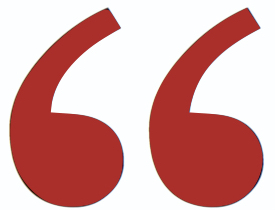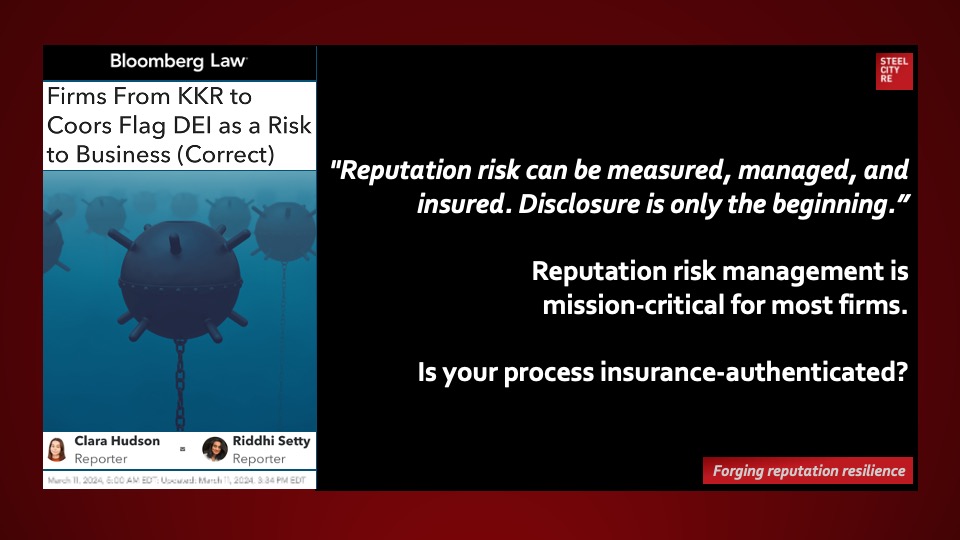DEI as a Reputation Risk to Business
DEI as a Reputation Risk to Business. A “flurry of securities filings noting potential legal and reputation risks stemming from diversity, equity and inclusion efforts follows the US Supreme Court’s June decision .” […] “If we do not successfully manage expectations across these varied stakeholder interests, it could erode stakeholder trust, impact our reputation, and/or constrain our investment and fundraising opportunities,” one filing said.A “flurry of securities filings noting potential legal and reputation risks stemming from diversity, equity and inclusion efforts follows the US Supreme Court’s June decision .” […] “If we do not successfully manage expectations across these varied stakeholder interests, it could erode stakeholder trust, impact our reputation, and/or constrain our investment and fundraising opportunities,” one filing said.
Click on the image above to read more (No Paywall).

Reputation risk can be measured, managed, and insured. Disclosure is only the beginning.
Bloomberg Law: March 11, 2024

Steel City Re’s strategic tools help risk managers build corporate resilience by predicting reputation risk, protecting enterprise value, and promoting risk management. We help risk managers manage risk and add value across Boardrooms, C-Suites, and operational silos through reputation resilience.
Reputation is Mission-Critical
Today’s sophisticated risk managers are strategic corporate talents, helping the C-suite and board meed stakeholder expectations for resilience. They know that enterprise damage from reputation risks might be their greatest and longest lasting peril, so they monitor for red flags. They foster a culture that respects those warnings and facilitate processes to mitigate those risks. Their diligence strategically builds enterprise-wide resilience that informed stakeholders can appreciate, and they use insurance two ways: operationally, to foster resilience; and strategically, to authenticate their thoughtful risk management and dutiful governance systems.
The results of strategic reputation risk management are evident in reputation resilience. More than crisis recovery, they include customers buying, not boycotting; employees working, not fleeing; investors buying, not selling; lenders adjusting interest rates down, not up; regulators deferring, not enforcing; and social license holders acquiescing, not protesting.
DEI as a Reputation Risk to Business. Having a robust Reputation Resilience Program in place offers, amongst other benefits:
- Protection for the company, its staff, executives, and board from litigation and regulatory challenges
- Improved governance processes and better enterprise risk management protocols; i.e., measuring reputational risk
- Establishment of an agile operating, communications, and decision-making team, with clear roles and responsibilities, trained and ready to handle all reputational threats; i.e., a reputation risk management framework
- Proactive management of risks that could give rise to delays or derailing concerns around new product and strategic partnership launches
- Captured behavioral economic value from stakeholders; i.e., value of reputation
- Reduced costs of debt and risk transfer while boosting equity value; i.e., boosting reputational value
A hazard of reputation risk is a lurking gap between stakeholder expectations and reality. Another hazard is the emotional intensity associated with expectations. The expected surge in litigation in 2024 around environments, social and governance issues reflects both that emotional intensity and is one manifestation of the anger from disappointed stakeholders. This video explains the behavioral economic features of the many perils of reputation risk.
Mitigating risk strategically through expectation management and operational adjustments evinces thoughtful management and dutiful governance. Financing such risks evinces prudence, and doing so publicly enables stakeholders to appreciate and value the effort.
One Question
DEI as a Reputation Risk to Business. Reputation risks are prevalent, material, and place both corporate viability and profitability at risk. Is enhancing and promoting the quality of your risk management program part of your strategy?

